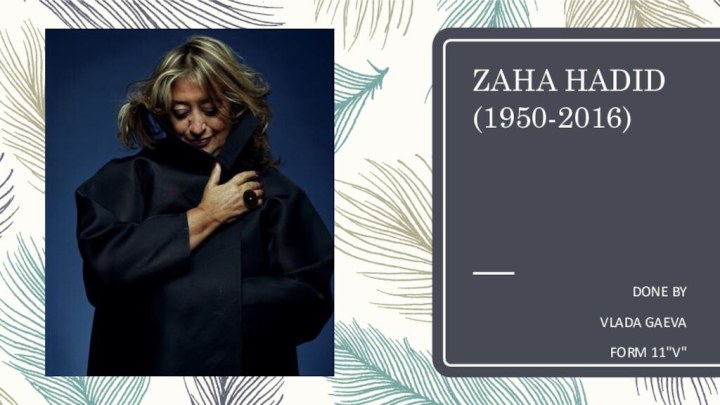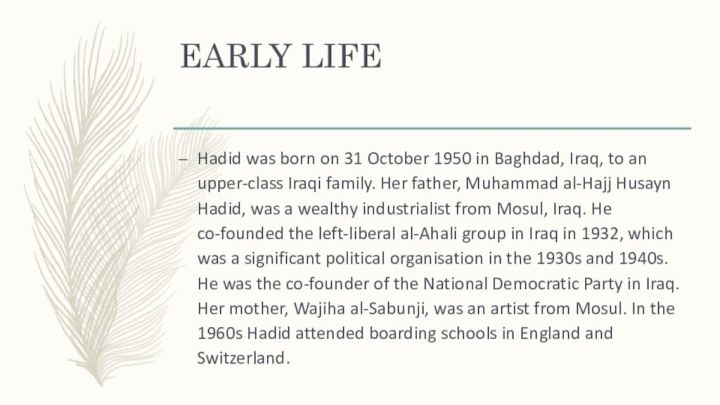- Главная
- Разное
- Бизнес и предпринимательство
- Образование
- Развлечения
- Государство
- Спорт
- Графика
- Культурология
- Еда и кулинария
- Лингвистика
- Религиоведение
- Черчение
- Физкультура
- ИЗО
- Психология
- Социология
- Английский язык
- Астрономия
- Алгебра
- Биология
- География
- Геометрия
- Детские презентации
- Информатика
- История
- Литература
- Маркетинг
- Математика
- Медицина
- Менеджмент
- Музыка
- МХК
- Немецкий язык
- ОБЖ
- Обществознание
- Окружающий мир
- Педагогика
- Русский язык
- Технология
- Физика
- Философия
- Химия
- Шаблоны, картинки для презентаций
- Экология
- Экономика
- Юриспруденция
Что такое findslide.org?
FindSlide.org - это сайт презентаций, докладов, шаблонов в формате PowerPoint.
Обратная связь
Email: Нажмите что бы посмотреть
Презентация на тему по английскому языку на тему Архитектура 11 класс
Содержание
- 2. EARLY LIFEHadid was born on 31 October
- 3. Hadid studied mathematics at the American University
- 4. In the mid-1980s, Hadid taught at the
- 5. INTERIOR ARCHITECIRE Hadid's fluid interior of the
- 6. Dubbed 'Queen of the curve', Hadid has
- 7. AWARDS, NOMINATIONS AND RECOGNITIONShe won the Stirling
- 8. Скачать презентацию
- 9. Похожие презентации
EARLY LIFEHadid was born on 31 October 1950 in Baghdad, Iraq, to an upper-class Iraqi family. Her father, Muhammad al-Hajj Husayn Hadid, was a wealthy industrialist from Mosul, Iraq. He co-founded the left-liberal al-Ahali group in








Слайд 3 Hadid studied mathematics at the American University of
Beirut before moving, in 1972, to London to study
at the Architectural Association School of Architecture. There she met Rem Koolhaas, Elia Zenghelis and Bernard Tschumi. She worked for her former professors, Koolhaas and Zenghelis, at the Office for Metropolitan Architecture, in Rotterdam, the Netherlands, becoming a partner in 1977.Through her association with Koolhaas, she met Peter Rice, the engineer who gave her support and encouragement early on, at a time when her work seemed difficult.Hadid was a naturalised citizen of the United Kingdom.Слайд 4 In the mid-1980s, Hadid taught at the Harvard
Graduate School of Design,where she held the Kenzo Tange
Professorship, and at the Architectural Association.In the 1990s, she held the Sullivan Chair professorship at the University of Illinois at Chicago's School of Architecture. At various times, she served as guest professor at the Hochschule fur bildende Kunste Hamburg (HFBK Hamburg), the Knowlton School of Architecture at Ohio State University, the Masters Studio at Columbia University, and was the Eero Saarinen Visiting Professor of Architectural Design at the Yale School of Architecture.
Слайд 5
INTERIOR ARCHITECIRE
Hadid's fluid interior of the Silken
Puerta America in Madrid
Hadid also undertook some high-profile interior
work, including the Mind Zone at the Millennium Dome in London as well as creating fluid furniture installations within the Georgian surroundings of Home House private members club in Marylebone, and the Z.CAR hydrogen-powered, three-wheeled automobile. In 2009 she worked with the clothing brand Lacoste, to create a new, high fashion, and advanced boot. In the same year, she also collaborated with the brassware manufacturer Triflow Concepts to produce two new designs in her signature parametric architectural style.Слайд 6 Dubbed 'Queen of the curve', Hadid has a
reputation as the world's top female architect, although her
reputation is not without criticism. She is considered an architect of unconventional thinking, whose buildings are organic, dynamic and sculptural. Stanton and others also compliment her on her unique organic designs: "One of the main characteristics of her work is that however clearly recognizable, it can never be pigeonholed into a stylistic signature. Digital knowledge, technology-driven mutations, shapes inspired by the organic and biological world, as well as geometrical interpretation of the landscape are constant elements of her practice. Yet, the multiplicity and variety of the combination among these facets prevent the risk of self-referential solutions and repetitions." Allison Lee Palmer considers Hadid a leader of Deconstructivism in architecture, writing that, "Almost all of Hadid's buildings appear to melt, bend, and curve into a new architectural language that defies description. Her completed buildings span the globe and include the Jockey Club Innovation Tower on the north side of the Hong Kong Polytechnic University in Hong Kong, completed in 2013, that provides Hong Kong an entry into the world stage of cutting-edge architecture by revealing a design that dissolved traditional architecture, the so called modernist “glass box,” into a shattering of windows and melting of walls to form organic structures with halls and stairways that flow through the building, pooling open into rooms and foyers.
Слайд 7
AWARDS, NOMINATIONS AND RECOGNITION
She won the Stirling Prize
two years running: in 2010, for one of her
most celebrated works, the MAXXI in Rome, and in 2011 for the Evelyn Grace Academy, a Z shaped school in Brixton, London. She also designed the Dongdaemun Design Plaza & Park in Seoul, South Korea, which was the centerpiece of the festivities for the city's designation as World Design Capital 2010. In 2014, the Heydar Aliyev Cultural Centre, designed by her, won the Design Museum Design of the Year Award, making her the first woman to win the top prize in that competition.She was listed as one of the "50 Best-Dressed over 50" by the Guardian in March 2013. Three years later, she was assessed as one of the 100 most powerful women in the UK by Woman's Hour on BBC Radio 4.





























